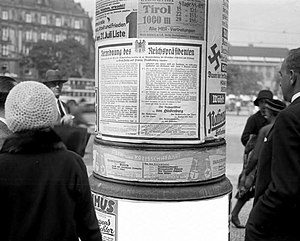Preußenschlag


show This article may be expanded with text translated from the corresponding article in German. (September 2018) Click [show] for important translation instructions. |
The Preußenschlag of 1932 (German pronunciation: [ˈpʁɔʏsənˌʃlaːk], "Prussian coup"), also known in English as the coup in Prussia or the putsch in Prussia, was the takeover of the Free State of Prussia, the largest State of the German Reich, by Chancellor Franz von Papen using an emergency decree issued by President Paul von Hindenburg under Article 48 of the Weimar Constitution on 20 July 1932.
It was a major step towards the end of the Weimar Republic, as it later facilitated the Nazification (Gleichschaltung) of Germany after Adolf Hitler's rise to power on 30 January 1933.
The pretext for this measure was violent unrest in some areas of Prussia and the alleged inability of the Prussian government to handle the matter. The main trigger was the "Altonaer Blutsonntag" ("Altona Bloody Sunday"), a violent clash between the Sturmabteilung (SA) and Communists in Altona, then a Prussian city near Hamburg, on 17 July 1932. 18 people died, 16 of whom were shot by police.[1] It is more likely[editorializing] however that the Prussian government headed by Minister-President Otto Braun, with authority over the powerful Prussian police force, was simply one of the last major forces standing in the way of Papen's plans for nationalist rule.[2]
The move was facilitated by the unstable situation of the Prussian government. The centre-left coalition of the Social Democrats, Centre Party and liberal German Democratic Party had ruled Prussia without interruption since 1918, but had lost its majority in the Landtag (state parliament) in the election on 24 April 1932. However, under the Prussian constitution, a government could be removed from office only if there was a positive majority for a prospective successor. This provision, known as a "constructive vote of no confidence," was intended to ensure that a government had sufficient support to govern.
The Communists and National Socialists held over half the seats between them, but would not cooperate with each other or with other parties. Thus, no politically realistic alternative government was possible, and the Braun-led coalition remained in office.
However, Papen also lacked majority support in the Reichstag. His only means to govern was through the emergency provisions of Article 48, and hence via decrees issued by the Reichspräsident Hindenburg, over whom Papen had great influence. The emergency decree of 20 July dismissed the Braun government and declared Papen Reichskommissar (Reich Commissioner) for Prussia, vested in him all the competences of the Prussian ministries, and gave him direct control over the Prussian government.[3]
The decree was declared partially unconstitutional on 25 October 1932 by the German Constitutional Court, but only in so far as the formal existence of the Prussian cabinet was concerned. The transfer of power to Papen was upheld, while the Braun cabinet retained the right to represent Prussia in the Reichsrat.
Prussia remained under direct administration of the federal government until April 1933. The Enabling Act of 1933 gave Hitler the effective power to enact legislation (including extraconstitutional laws) without the consent of the Reichstag. One of Hitler's uses of the Enabling Act was to dissolve all of the state parliaments (except Prussia's) and reconstitute them based on the results of the partly-free federal election held in March (with the exception of Communist seats). Prussia was excluded from this measure because it had held state elections at the same time, with a similar result (a Nazi plurality). With the Communists now banned and most Social Democrats either jailed or in exile (the SPD would be banned outright in June), the Nazis now had a majority in the Prussian parliament, which elected Hermann Göring as Minister-President. However, under Hitler's rule, German states were effectively replaced by Nazi Gaue, so Göring's post was largely ceremonial.
The state of Prussia was finally dissolved by the Allies after the end of World War II.
References[]
- ^ Heinrich Breloer, Horst Königstein: Blutgeld. Materialien zu einer deutschen Geschichte, 1982, ISBN 3-922009-46-8, p. 22.
- ^ 20. Juli 1932: Die preußische Regierung wird von der rechtskonservativen Regierung abgesetzt [20 July 1932: The Prussian government is deposed by the right-wing conservative government] (in German), archived from the original on 7 October 2001, retrieved 4 May 2013:
- Immer wieder haben Konservative, Monarchisten und zuletzt sogar offen der Hohenzollern-Kronprinz eine Beseitigung der "republikanischen Festung Preußen", dieses "marxistischen Spuks", gefordert. [Again and again, conservatives, monarchists, and lately even the Hohenzollern crown prince have openly demanded the ousting of the "republican stronghold of Prussia", of this "Marxist spook".]
- ^ Walter, Franz (2007-07-19), "Putsch am 20. Juli 1932: Wie der Mythos Preußen zerschlagen wurde" [The coup of 20 July 1932: How the myth of Prussia was smashed], Der Spiegel (in German), Hamburg, retrieved 4 May 2013:
- Ein Tag als Lehrstück: für die antidemokratische Skrupellosigkeit der Konservativen jener Jahre, für die Hilflosigkeit und Ermattung der stets nur rhetorisch kraftvoll auftretenden Sozialdemokratie, für die Erosion und den Zerfall der republiktreuen Mitte – schon Monate vor der Etablierung des NS-Regimes. [One day as an object lesson: in the antidemocratic unscrupulousness of the conservatives of those years, in the helplessness and fatigue of the Social Democrats, who only rhetorically ever seemed powerful, in the erosion and breakup of the republican center — months before the establishment of the Nazi regime.]
Sources[]
- Lexikon der deutschen Geschichte – Ploetz, Verlag Herder, Freiburg im Breisgau, Österreich 2001 (in German)
- 1932 in law
- 1932 in Germany
- 1930s in Prussia
- Politics of the Weimar Republic
- German words and phrases
- 1930s coups d'état and coup attempts
- Politics of Prussia
- July 1932 events
- Conflicts in 1932